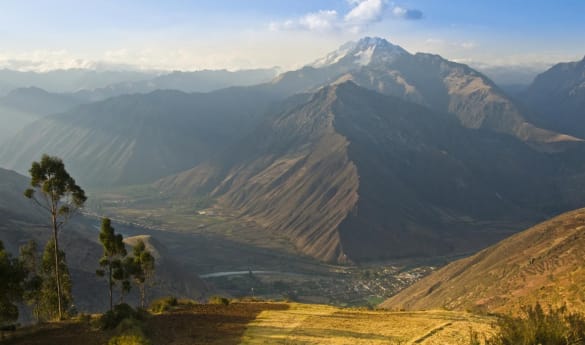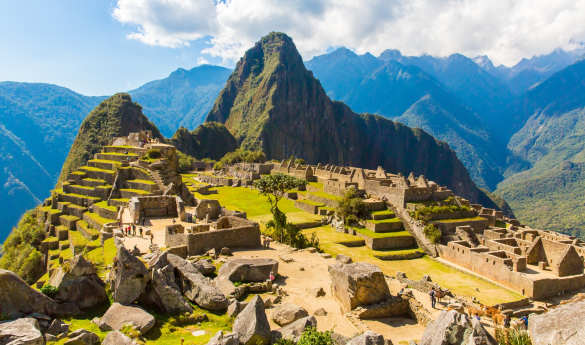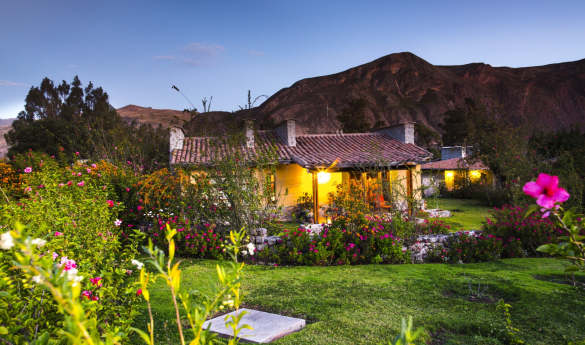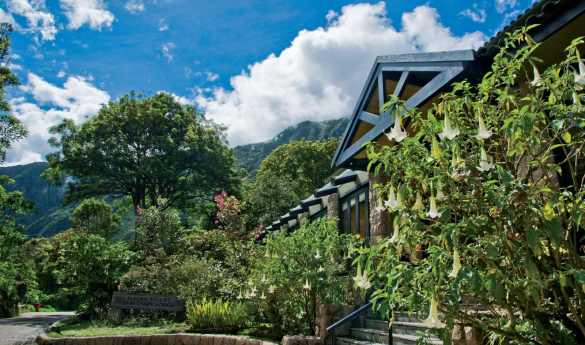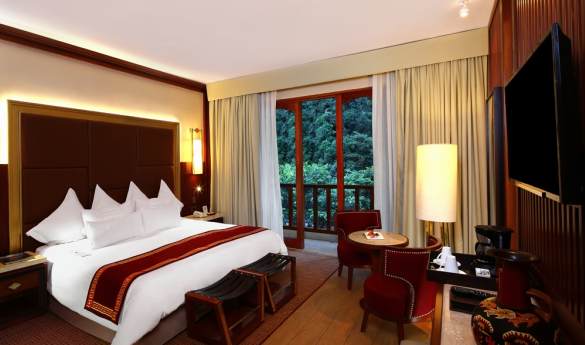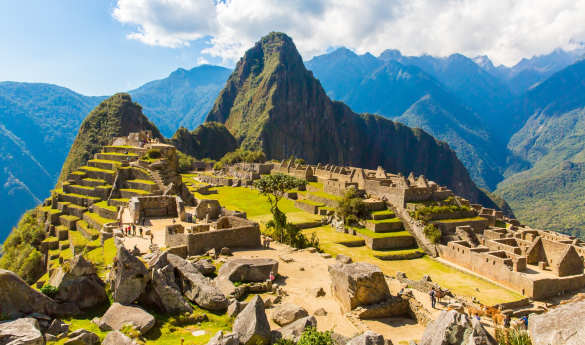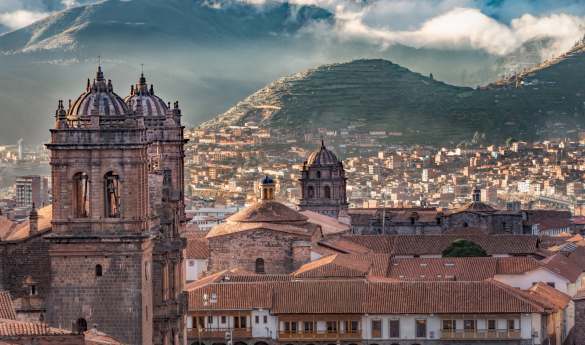The Complete Guide to the Inca Trail
Legendary around the world, the Inca Trail leads you through breathtaking landscapes across several days, following in the footsteps of ancient Inca messengers.

Widely considered to be the ultimate Peruvian experience, the Inca Trail rewards daring hikers with jaw-dropping scenery and a deep sense of culture and history. The trek can be demanding, and you’ll need to spend time acclimatizing, but this iconic journey through the heart of Peru’s wild mountain and valley terrain is a once-in-a-lifetime memory to keep forever.
This ancient hiking trail is the path the ancient Incas would have used to reach the citadel of Machu Picchu several centuries ago. Passing through the spectacular Andean landscapes, the route winds its way through the dramatic scenery of the Sacred Valley towards the celebrated ‘Lost City’.
Whether you choose the 4-day trek or join the trail on its final leg as it approaches Machu Picchu, tracing the path of the Incas is guaranteed to be a highlight on any Peru itinerary.
Where Does the Inca Trail Start?

When you’re planning the details of your hike, one of your first questions is likely to be: where is the Inca Trail?
Everyone setting out to tackle the Inca Trail will head to Cusco initially, as it’s the closest city to the trail. There are no direct flights from the US to Cusco, but once you get to South America, it’s only an hour and a half away from Lima by plane.
While many people just use it as a base for traveling to Machu Picchu or the Sacred Valley, we recommend setting aside some extra days to explore Cusco and see why it’s one of the most popular places to visit in Peru. Spending time in Cusco before you do the hike can also help you acclimatize to the altitude in the region and help you avoid altitude sickness during your hike.
The Inca Trail itself has two starting points: Piscacucho or Quillabamba. From here, you’ll travel through lush cloud forests, mountain valleys, and isolated Incan ruins, all showcasing the natural beauty and fascinating history of the region. From snow-capped peaks to stunning glacial lakes, the astonishing panoramas are impressive from the first day of your trek to the last.
Trekking the Inca Trail

Before you set off on your adventure, here is everything you need to know before you go:
Please note that due to government regulations, you must hike the Inca Trail with a guide. Luckily, our travel specialists can help with all the admin, helping you find a licensed operator and secure the necessary permit.
How long is the Inca Trail?
The 4-day Inca Trail is about 25 miles long, but many tours will also offer a shorter route that only involves part of the trail.
You’ve likely heard about how altitude affects how much you can exert yourself, and may be asking: how high is the Inca Trail? Elevation varies at different points along the trail and ranges from about 8,500 feet to over 13,700 feet, meaning it’s crucial to acclimatize in Cusco (about 11,150 feet) before you go.
How long does it take to hike?
Hiking the 4-day Inca Trail (25-mile) route takes four days and three nights altogether, while shorter routes can take two days and one night. How many hours you spend walking each day will depend on your fitness and the speed of the group.
How hard is the Inca Trail?
The Inca Trail is a moderately difficult hike, and we recommend being fully prepared for it in advance, especially if you’ve never done a long trek before or exercised at higher elevations. There are more difficult sections across the trail that are particularly mountainous or high, such as the infamous Dead Woman’s Pass, which may test you physically.
While people of all ages tackle the trail, it’s important to be mindful that this trip also involves camping, and there are limited toilet facilities along the route, so the hike may not be suitable for young children or older family members.
What route does the trail take?

The Inca Trail follows different routes with a variety of camping locations and pit stops along the way. While there’s one main trail, the hiking itinerary may vary from group to group, especially when it comes to campsites.
We’ve put together an example of what the four-day route might look like:
If you want to spend more time in the area, our travel specialist Julie Norton shares her top accommodation recommendation:
“Sanctuary Lodge (Belmond Property) is a great place to stay in Machu Picchu as it is the only hotel near the entrance to the park. Aside from Belmond properties being absolutely beautiful, they have great restaurants, yoga and meditation space, and an area for outdoor massages. Since they are at the top, guests also have the option to be some of the first people in the park for the day, enjoying a quiet sunrise. They also have a room option where you can see Huayna Picchu from your window.”
What to Pack for the Inca Trail
Figuring out what to bring to the Inca Trail requires some thought and preparation – things like warm clothing for cool nights and a battery pack for your phone.
Think of packing for the Inca Trail like this:
- Things you need for your Peru holiday
- Things you need during the hike
- Things you need at camp
Your regular vacation luggage can be left in storage at your hotel. You’ll then be able to take a small day bag with you on the hike itself, plus a bag weighing up to 6 kilos (just over 13 lbs) with all your camp essentials like your sleeping bag and clothes.
Porters will carry this second bag for you during the day, but that does mean you’ll only have access to this bag when you arrive at camp for the night. So, you’ll need to think carefully about how you split up your belongings.
Clothes
Due to Peru’s equatorial climate, you’re probably wondering what to wear on the Inca Trail. Depending on when you travel, you’ll experience different conditions. If you visit between November and January, you’ll need more waterproof gear to tackle Peru’s rainy season, but if you travel in June or July, breathable clothing will keep you cool as you hike.
No matter what time of year you visit, your clothes should keep you warm, dry, and protect you from the sun.
Here’s what we recommend packing:
- 2-3 pairs of hiking/athletic trousers
- 3-4 short-sleeve tops
- 1-2 long-sleeve tops
- 1 thin fleece
- A warm hat
- A cap or lightweight hat
- A good pair of hiking boots
- A pair of slip-on shoes or flip-flops for camp
- A rain poncho to keep you and your pack dry
- 5-6 pairs of socks (plus spares if you’re traveling in the rainy season)
Most of this will go in your porter bag, but it’s a good idea to pack a warm layer, your hat, and poncho, plus a spare pair of socks in your day bag in case the weather changes.
Hiking equipment and gear
Trekking the Inca Trail does require a fair bit of equipment, but again, most of this can go in your porter bag, so you don’t have to carry it around the whole time.
Here are some essentials we recommend for hiking the Inca Trail:
- A sturdy day bag
- A water bladder and lightweight water bottle
- A sleeping bag and sleeping mat
- An inflatable pillow
- Trekking poles
- A headlamp
- A microfiber towel/washcloth
Luckily, most tour operators will provide key supplies like a sleeping bag and trekking poles, but it’s important to check.
Toiletries
Alongside your basic toiletries, there are a few things we recommend bringing along during your hike:
- Body/face wipes
- Antibacterial wipes
- Sunscreen
- Any medication
- Altitude-sickness tablets
- Band-Aids
- Tissues
It’s worth noting that there are no showers and limited toilet facilities along the route, so we recommend packing your toiletries in your day bag so you can refresh on the go.
Other essentials
Finally, here are some last bits to go in your day bag:
- Sunglasses
- Phone and battery pack
- Camera
- Snacks
- Passport (you’ll need it to enter the park)
- Sandwich bags to keep everything dry and organized
Book Your Peru Trip with Scott Dunn
Excited to tackle the Inca Trail?
At Scott Dunn, our travel specialists are on hand to help you craft the perfect Peruvian vacation. From securing your Machu Picchu permit to planning many other exciting things to do in Peru before or after your trek, we’ll handle everything and create a trip that’s truly bespoke to you.
Take a look at our suggested tours, or get in touch with a travel specialist today to start planning your adventure.
Meet our specialists
Call us on 212 372 7009 to start planning your vacation
Why Scott Dunn?
Unique to You
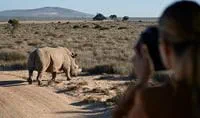
- We listen to your travel goals and craft unique trips that are personalized to you.
- We’re with you every step of your life’s travel journey, from honeymoons to family trips and beyond.
Seamless Service
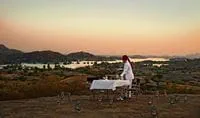
- Global offices in the UK, US, and Singapore for 24/7 seamless service.
- We offer flexibility if your plans change so you can book with confidence and peace of mind.
Carefully Curated Collection
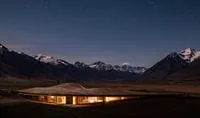
- We’ve curated an elevated collection of accommodation, experiences, and guides.
- Committed to fostering close global relationships to continue bringing you unique experiences.
Luxury in Every Sense

- We deliver a sense of luxury that matters most to you.
- Awarded Condé Nast Traveler’s Top Travel Specialists in the World 12 years in a row.




